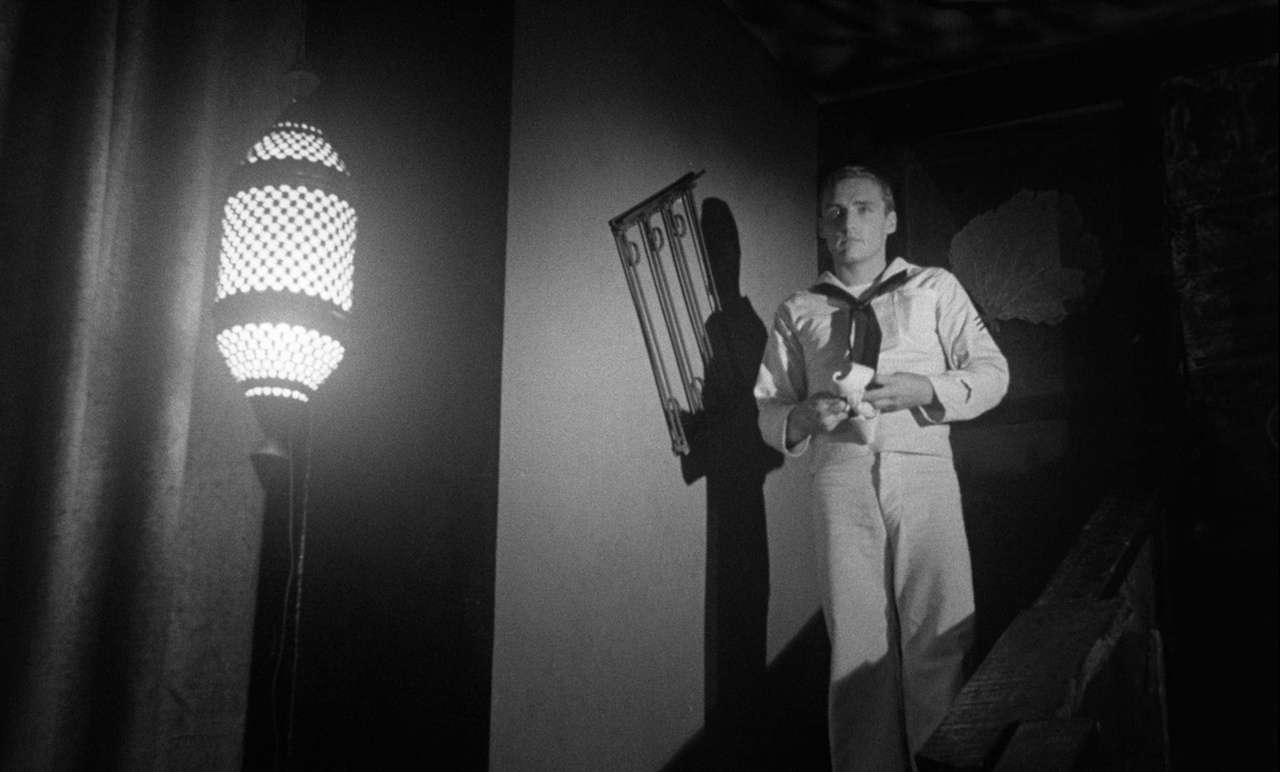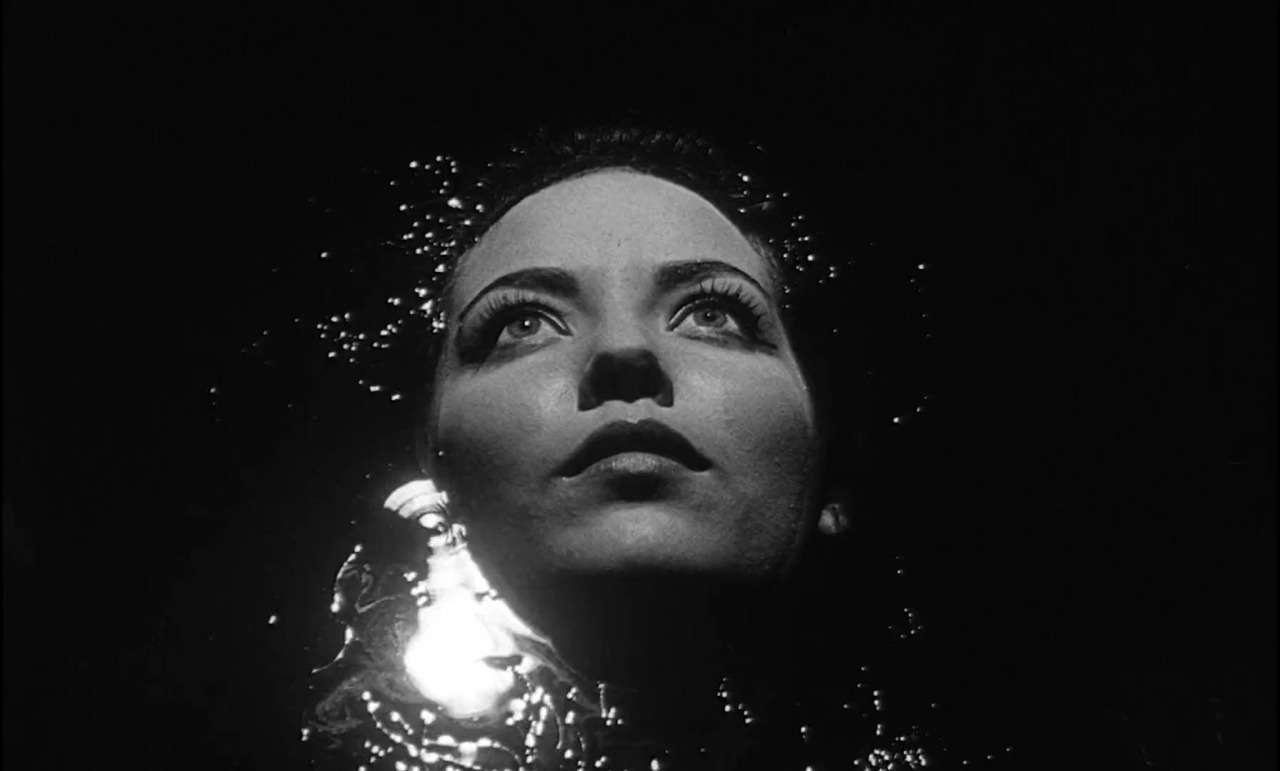It was many and many a year ago,
In a kingdom by the sea,
That a maiden there lived whom you may know
By the name of ANNABEL LEE;
And this maiden she lived with no other thought
Than to love and be loved by me.
– Edgar Allan Poe
Curtis Harrington’s debut feature – “Night Tide” (1961), if nothing, was genre-bending. The film remains a haunting experience, yet it can’t be justified in a generic understanding of cinema. Based on a poem by Edgar Allan Poe, Annabel Lee, Mora’s character, is a perfect description of what Poe felt when he wrote the poem. The subtle, unpronounced beauty of Linda Lawson seduces the innocent and cute-looking Johnny boy as he sits down in a diminutive manner in a Blues bar.
As “Night Tide” (1961) opens up with its establishing shots, it shoots straight to the language of the atmospheric thrillers of the 1940s. The lighting and the fast-paced eerie blues perfectly set the mood for “something is not right.” Cukor’s “Gaslight,” Hitchcock’s “Spellbound,” and Farrow’s “The Big Clock” are some movies that come to mind as we observe the opening of the “Night Tide.” Yet, Harrington does not have the same kind of expertise, and it shows in the fanciful lighting and the minimal sets of “Night Tide.”
The romance is haunting; the sets are diminutive; the lights are reminiscent of the German Expressionist and American noir films. If your movie is based on Poe’s poetry, the moody, chiaroscuro-esque understanding of love is nothing but guaranteed.
Night Tide (1961) Plot Summary & Movie Synopsis:
What does the Mysterious Woman Say to Mora?
As a desolate yet innocent-looking Johnny glides through the pier through its various attractions, he wants to blend in, even though it’s hard to because of his sailor uniform. He stands out like a sore thumb. His loneliness gives it away. It is evident that he has not been deployed yet, and he is only visiting because it’s his day off. Even though he is an adult, Johnny is seduced by the attractions in various arcades. There is an aimlessness about Johnny, which results in him going to the instant photo booth and clicking pictures of himself (the earliest kind of selfies, maybe). He looks like a young boy who wants to try out every ride and attraction available in an arcade.
Johnny inches toward a blues bar, and as the music becomes louder, he is drawn in; he buys a beer and sits in one corner. He doesn’t have the confidence of a man who knows what he wants. Through his movements, you can deduce that there is nothing pre-planned. His approaching the corner is also interesting as he bends down to not disturb the crowd from watching the performers.
Being in a base for so long probably does more harm than good for him, as if he is scanning out a new place like a child does when they visit a stranger’s house. In the same way that a child makes friends, Johnny spots a lovely, lonely young maiden sitting across from him. He goes and sits before her and tries to make conversation, but she just wants to enjoy the music and does not pay heed to this nonsense of a young boy trying to chat her up.
The conversation is cut short as a mysterious woman, played by the evergreen Marjorie Cameron, walks up to her and tells her something in a language other than English. Her expression changes to as if her life is being threatened. She gives Johnny some money, asks him to pay for her drinks and leaves. You need to be European to have an ear for which language it is. Harrington’s genius lies in this as the major European languages were avoided, and the chosen language would confuse you as it’s some form of a Gypsy-infused dialect or a language spoken by tribes, thereby delineating Mora as someone who is not American.

The immigrant debate is common yet hypocritical, at the very least. The subtitles for what Cameron says to Mora are also cleverly not included, but the internet is undefeated, and the explanation lies in the movie trivia section of IMDb. I will get to that explanation at the end of this article.
Who is the Film’s Protagonist?
Linda Lawson couldn’t have played Mora better. She was aloof yet alluring. As she leaves, Johnny follows, and after much cajoling, she allows him to walk her to her house. If you want to adhere to some lingo as espoused and empowered by Generation Z, you would have seen the ‘Red Flags’ a long way off. Her house was above an indoor merry-go-round, and she invited him over for breakfast. Mora is different, and her mysterious behavior is a requirement for Johnny to be head-over-heels for her.
So when he meets the jovial owner of the merry-go-round who asks him to check his wooden horses out, he seems a bit perplexed as to why he is here, and the reason leaves his brows in a cross. His daughter, the simple and beautiful Ellen, played by Luana Anders, takes a bit of a shine to this clean-cut sailor. She also is perplexed by his visit to Mora.
In simple terms, the night siren’s breakfast can be considered a red herring. The truth was somewhere hidden, but the nagging feeling of avoiding it was what the young sailor coveted. Both Mora and Johnny epitomize the pinnacle of lonely lovers finding each other on a chance occasion, but there is something eerie at play as Mora talks about her love for the sea while catching a seagull with her bare hands. Johnny is a bit jarred and fascinated by this creature until she reveals what her work is. She is a mermaid and is considered an attraction while people pay to watch her. The night siren’s call is strong; she ensures he is hooked onto her.
Johnny falls head over heels for Mora, even though the film is rife with many warnings for the baby-faced Johnny. Captain Murdock, who is the owner of the mermaid attraction, apparently fetched her from the Greek island of Mykonos, and he has a lot of exciting stories to tell about her. He asks Johnny to visit him sometime. The arcade is a place for fun and games. Still, there is a hushed pall of secrecy that is revealed to Johnny when the captivatingly beautiful Ellen and the clairvoyant Madame Romanovitch, played by Marjorie Eaton, reveal to him, along with the Lieutenant, that the last two men seen around Mora have both vanished from the face of the earth.
As the film strides forward, the love between Johnny and Mora deepens, and like the depth of their love, the warnings of Johnny’s well-wishers keep increasing. Mora collapses on the beach while she is dancing after taking one look at the mysterious woman. Even though that raises a lot of suspicion about who that woman is and what kind of hold she has over Mora, the dance is mesmerizing. The bongos and the beats create a surreal ‘dance of the dead’ sequence as Mora’s moves even make Johnny question it as ‘interesting’ through his expressions.
The sequence of Johnny following the mysterious woman is probably the most poignant scene in the entire film. He is led through bridges and winding stairs by the woman to a dirty, filthy area of the gypsies, where the woman vanishes. The squalor of the immigrant life punches through Harrington’s black-and-white lensing. An empty chair and a baby standing with their doll is an image more haunting than the love story at hand. Johnny, the great American sailor, has no words for what he sees.
This is the brilliance of the director Curtis Harrington, who foreshadows Alice in Wonderland as Johnny lands up in Capt. Murdock’s house as if led by the mysterious woman where he tells Johnny about Mora’s past. The more he is led into what Mora can be, the more evident that something is at bay here. The end is nigh, yet the end is not something that Johnny wants to look forward to. Mora, Capt. Murdock and the clairvoyant are all the foreshadowing options that Harrington uses, yet Johnny holds strong.
Who Kills Mora?

I know this might be a spoiler, but there is nothing the death of Mora actually reveals. There are many options as to how it could’ve happened. One night, as Johnny sleeps on the sofa, the light reflects on his face, as it would when light falls on the ocean. He wakes up to see the beautiful Mora traipsing through the cramped room. She sits beside him and kisses him, and as he breaks from the kiss and looks down, Mora’s legs are not there anymore. They have been replaced by the mermaid’s fins, and the beautiful dream changes from that to a nightmare, as Mora is not the beautiful night siren anymore. She is a sea monster who is strangling him to death, and he wakes up. He goes in search of Mora only to find her drowning under the pier.
The sci-fi shifts to the psychological thriller from this moment forward. From a fantasy perspective, Mora as a mermaid works for the texture of the film, the moody lighting, and the minimal sets, but the film does not commit to any genre. As Mora takes him for a deep-sea diving session, Johnny’s impending doom makes him fearful of all the superstitions that everybody talks about. It also is a subtle nod to the reappearance of the immigration debate as Johnny, the naïve American, becomes brainwashed by the already naturalized Americans.
If we delve through the history of America post-1960s, there is a definite stigmatization and discrimination against Greeks, Poles, Portuguese, and Italians in favor of Western Europeans. The law was finally changed in 1965. The film is politically placed on very delicate edges of history as the 60s were also the burgeoning of the Civil Rights and the counterculture movement.
Mora’s grip on reality loosens as she tries to cut the oxygen pipe of Johnny’s underwater rig, and Johnny, terrified, bobs up, thus realizing his naivete. Mora vanishes, and after some time, Johnny hides in a hotel as he goes back to the Mermaid show only to see the dead body of Mora. The gunfight and the apparent capture of Johnny are solved as Murdock confesses that he wanted to keep Mora all for himself, and when he finds that Mora is going to grow into a fiercely independent woman, he implants the idea of the sea people and how she was one of them. He also confesses to the murder of the two boys before Johnny and makes Mora try to kill him, and instead of living with the weight of it, Mora kills herself.
Night Tide (1961) Movie Ending Explained:
Is the Mysterious Woman a Figment of Mora’s Imagination?
Mora is presented as a victim of Gavin Muir’s character, Capt. Murdock talks about it at the end, but this is where the IMDb movie trivia section becomes interesting, and we finally answer our first question. If what Murdock is saying is true, then what is that woman? Is she a figment of Mora’s imagination? If summarized, the comment acknowledges the sea people’s existence by translating what the subtitle-less mysterious woman says to Mora at the blues bar. It says how she will be meeting her people soon. This opens up so many new avenues to the dynamic of the story.
If understood from the perspective of a fantasy, she is a mermaid, and Johnny kills her after learning the truth that he was avoiding on that fateful dive in the sea. The psychological angle is still the most valid perspective of the film. As Murdock says, his experiment was too well constructed, and maybe he hired that mysterious woman to play that dirty trick and reinforce the idea of the sea people so that she would stop meeting up with men and destroy Murdock’s business.
This might be a far-fetched understanding of the dialogue, but as the immigration debate is rife throughout the film, the film could’ve been the perfect foreshadowing of the change of law only four years down the line. In the end, Ellen comes to meet him at the police station, where he is cleared of the murder after Murdock’s confession. Both of them plan to meet, and finally, there is the homecoming of the American sailor who ends up falling in love with the naturalized American gal.
Overall, “Night Tide” is probably one of the most underrated gems cinema lovers need to explore.







